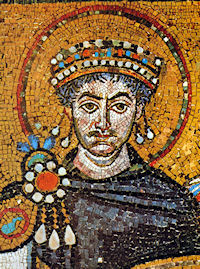Justinianian 518-602
 In the 6th century the emperor Justinian [r. 527-565], whose talents were equal to his ambitions, found himself, through the financial prudence of his predecessors, in a position to undertake the reconquest of some of the lost western provinces. The Vandal power had declined, and Africa was won back in one campaign by Belisarius in 533. The conquest of Italy was far more difficult. Begun by Belisarius in 532, it was not completed till 554 by Narses. A portion of southern Spain was also won from the Visigoths, so that the Romans again commanded the western straits.
Justinian, possessed by large ideas and intoxicated with the majesty of Rome, aspired to be a great conqueror, a great lawgiver, a great pontiff, a great diplomatist, a great builder, and in each of these spheres his reign holds a conspicuous place in the annals of the Empire. His legal work alone, or the building of Santa Sophia was enough to ensure him immortal fame. But deep shadows balance the splendour.
In the 6th century the emperor Justinian [r. 527-565], whose talents were equal to his ambitions, found himself, through the financial prudence of his predecessors, in a position to undertake the reconquest of some of the lost western provinces. The Vandal power had declined, and Africa was won back in one campaign by Belisarius in 533. The conquest of Italy was far more difficult. Begun by Belisarius in 532, it was not completed till 554 by Narses. A portion of southern Spain was also won from the Visigoths, so that the Romans again commanded the western straits.
Justinian, possessed by large ideas and intoxicated with the majesty of Rome, aspired to be a great conqueror, a great lawgiver, a great pontiff, a great diplomatist, a great builder, and in each of these spheres his reign holds a conspicuous place in the annals of the Empire. His legal work alone, or the building of Santa Sophia was enough to ensure him immortal fame. But deep shadows balance the splendour.
The reconquest of Africa was thoroughly justified and advantageous, but Italy was bought at a ruinous cost. In the first place, the Persian empire was at this time ruled by one of its greatest kings, Chosrocs I, who was far from peacefully inclined. Justinian was engaged in a long Persian and a long Gothic war at the same time, and the state was unequal to the strain. In the second place, it was all-important for his western policy to secure the goodwill of the Italian provincials and the Roman bishop, and for this purpose he involved himself in an ecclesiastical policy which caused the final alienation of the Syrian and Egyptian provinces. The reconquest of the West was purchased by the disunion of the East. Thirdly, the enormous expenses of the Italian and Persian wars, augmented by architectural undertakings, caused a policy of financial oppression which hung as a cloud over all the brilliance of his reign, and led to the decline which ensued upon his death. Nor is it to be forgotten that he had at the same time to fulfil the task of protecting the Danube against the Germans, Slavs and Bulgarians who constantly threatened the IUyrian provinces. He spared no expense in building forts and walls.
Justinian's name will always be associated with that of the gifted Theodora, an actress of doubtful fame in her early life, who shared his throne. Their mosaic portraits are preserved in the contemporary church of San Vitale at Ravenna. She possessed great political influence, and the fact that she was a heretic (monophysite), while Justinian was devoted to orthodoxy, did not mar their harmony, but only facilitated the policy of extending secret favor to the heretics who were publicly condemned, and enabled the left hand to act without the knowledge of the right.
The events of the half-century after Justinian's death exhibited the weakness to which his grandiose policy had reduced the Empire. It was attacked on the west, on the north and on the east, and at all points was unequal to coping with its enemies. Italy fell a victim to the Lombards , and in a few years more than half of the peninsula had passed under their sway.
The Avars, a Hunnic people who had advanced from the Caspian, took possession of Pannonia and Dacia, and formed an empire, consisting of Slavonic and Bulgarian subjects, which endured for about sixty years. Their chief occupation was to invade the Illyrian peninsula and extort tribute and ransoms from the emperors. So far as the Avars themselves were concerned, these incursions had no permanent significance, but the Slavs who overran the provinces did more than devastate. These years saw the beginning of the Slavonic settlements which changed the ethnical character of the peninsula, and thus mark the commencement of a new period. Slavs occupied Moesia and a large part of Macedonia, even close to Thessalonica, which they besieged; they penetrated southward into Greece and made large settlements in the Peloponnesus. They occupied the north-western provinces, which became Croatia and Servia, as well as Dalmatia (except some of the coast towns). In the northern part of the peninsula the Slavonic element remained dominant, but in Greece it was assimilated to the Greek (after the 9th century) and has left little record of itself except in place names.
The Empire was simultaneously engaged in the perennial strife with Persia. A short interval of peace was secured when the emperor Maurice assisted Chosroes II to dethrone a usurper, but after Maurice's death (602) the final and mortal struggle began. Throughout the incompetent reign of Phocas the eastern provinces were overrun by the Persians, as the Illyrian were overrun by the Slavs.
|
NEWSLETTER
|
| Join the GlobalSecurity.org mailing list |
|
|
|

